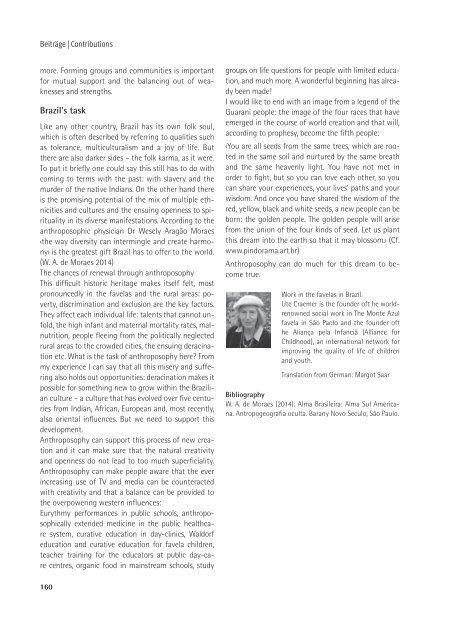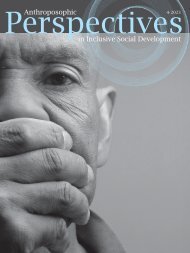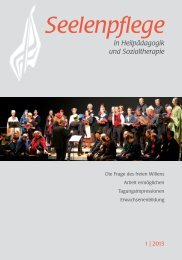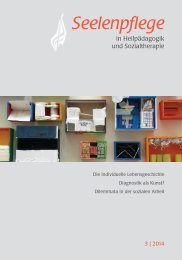Seelenpflege 2016-3-4 Spezial
Seelenpflege 2016-3-4 Spezial
Seelenpflege 2016-3-4 Spezial
You also want an ePaper? Increase the reach of your titles
YUMPU automatically turns print PDFs into web optimized ePapers that Google loves.
Beiträge | Contributions<br />
more. Forming groups and communities is important<br />
for mutual support and the balancing out of weaknesses<br />
and strengths.<br />
Brazil’s task<br />
Like any other country, Brazil has its own folk soul,<br />
which is often described by referring to qualities such<br />
as tolerance, multiculturalism and a joy of life. But<br />
there are also darker sides – the folk karma, as it were.<br />
To put it briefly one could say this still has to do with<br />
coming to terms with the past: with slavery and the<br />
murder of the native Indians. On the other hand there<br />
is the promising potential of the mix of multiple ethnicities<br />
and cultures and the ensuing openness to spirituality<br />
in its diverse manifestations. According to the<br />
anthroposophic physician Dr Wesely Aragão Moraes<br />
‹the way diversity can intermingle and create harmony›<br />
is the greatest gift Brazil has to offer to the world.<br />
(W. A. de Moraes 2014)<br />
The chances of renewal through anthroposophy<br />
This difficult historic heritage makes itself felt, most<br />
pronouncedly in the favelas and the rural areas: poverty,<br />
discrimination and exclusion are the key factors.<br />
They affect each individual life: talents that cannot unfold,<br />
the high infant and maternal mortality rates, malnutrition,<br />
people fleeing from the politically neglected<br />
rural areas to the crowded cities, the ensuing deracination<br />
etc. What is the task of anthroposophy here? From<br />
my experience I can say that all this misery and suffering<br />
also holds out opportunities: deracination makes it<br />
possible for something new to grow within the Brazilian<br />
culture – a culture that has evolved over five centuries<br />
from Indian, African, European and, most recently,<br />
also oriental influences. But we need to support this<br />
development.<br />
Anthroposophy can support this process of new creation<br />
and it can make sure that the natural creativity<br />
and openness do not lead to too much superficiality.<br />
Anthroposophy can make people aware that the ever<br />
increasing use of TV and media can be counteracted<br />
with creativity and that a balance can be provided to<br />
the overpowering western influences:<br />
Eurythmy performances in public schools, anthroposophically<br />
extended medicine in the public healthcare<br />
system, curative education in day-clinics, Waldorf<br />
education and curative education for favela children,<br />
teacher training for the educators at public day-care<br />
centres, organic food in mainstream schools, study<br />
groups on life questions for people with limited education,<br />
and much more. A wonderful beginning has already<br />
been made!<br />
I would like to end with an image from a legend of the<br />
Guarani people: the image of the four races that have<br />
emerged in the course of world creation and that will,<br />
according to prophesy, become the fifth people:<br />
‹You are all seeds from the same trees, which are rooted<br />
in the same soil and nurtured by the same breath<br />
and the same heavenly light. You have not met in<br />
order to fight, but so you can love each other, so you<br />
can share your experiences, your lives’ paths and your<br />
wisdom. And once you have shared the wisdom of the<br />
red, yellow, black and white seeds, a new people can be<br />
born: the golden people. The golden people will arise<br />
from the union of the four kinds of seed. Let us plant<br />
this dream into the earth so that it may blossom.› (Cf.<br />
www.pindorama.art.br)<br />
Anthroposophy can do much for this dream to become<br />
true.<br />
Work in the favelas in Brazil.<br />
Ute Craemer is the founder oft he worldrenowned<br />
social work in The Monte Azul<br />
favela in São Paolo and the founder oft<br />
he Aliança pela Infanciã (Alliance for<br />
Childhood), an international network for<br />
improving the quality of life of children<br />
and youth.<br />
Translation from German: Margot Saar<br />
Bibliography<br />
W. A. de Moraes (2014): Alma Brasileira: Alma Sul Americana.<br />
Antropogeografia oculta. Barany Novo Seculo, São Paulo.<br />
160






